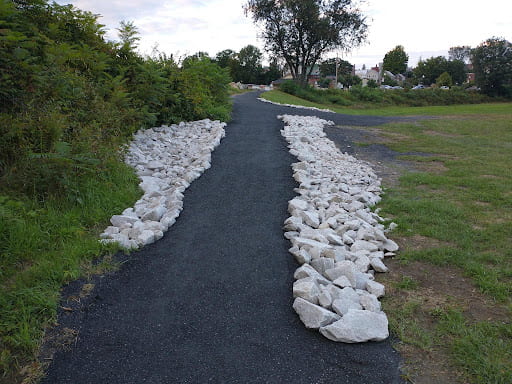
Sep 27, 2021 | Feature, News, Sports, TopStory |
By Adrienne Foss, Contributing Writer.
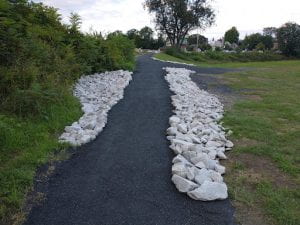

A pre-existing trail surrounding Prescott Field has recently been extended by over half a mile to meet the Americans with Disabilities Act standards and regulations. The highly trafficked trail is used by people all around the community, and the adaptations made will benefit nearly 40% of the Franklin County population according to project organizers.
The High Peaks Alliance is a non-profit organization that played a vital role in the creation of this trail. The organization wanted to know how they could improve the overall accessibility of this piece of land that so many people were already enjoying.
“We realized that there were no accessible trails in all of Franklin County,” Executive Director of the High Peaks Alliance Brent West said. He believes that more people need to get outside and to feel comfortable in the environment they’re in, and having safe and accessible trails is one of the first steps towards meeting that goal. “We hope that the work we do allows for more people to have more opportunities,” West said.
Gina Oswald has worked as a professor in Rehabilitation Services for three years at the University of Maine at Farmington. She has been working for and with people with disabilities for nearly 22 years, and she is always looking for ways to improve general accessibility and to remain inclusive. Oswald has also been a board member of the High Peaks Alliance since 2020 and has since been making extensive contributions to the accessibility aspects of the community. She has worked closely with West to see that this project comes to life. “Being in the field for so long, not only does it keep me passionate about these things, but it keeps me informed about what is and isn’t accessible for all,” Oswald said. “The world is a better place when everybody has the same opportunities and access.”
The ADA trail received funding and grants from multiple organizations in Maine, including the High Peaks Alliance and the Northern Forest Center. The Northern Forest Center provided a $50,000 grant to go towards the project, and the High Peaks Alliance fundraised the rest of the cost. The project added up to a total of $96,000.
The trail now extends from Front Street to the Narrow Gauge parking lot, and it consists of crushed natural and local rock that gives the appearance of smooth pavement. This now provides a safer and more reliable surface for people using a wheelchair, walker, or stroller. There was also a concerted effort to include braille, sign language, and tactile, along with other languages like French and Wabanaki on the informational signs around the trails.
The High Peaks Alliance is constantly seeking additional funding for future projects, and there are big plans for both the Farmington area and Franklin County as a whole.
“We have smaller local goals along with bigger and more grand hopes and dreams,” Oswald said.
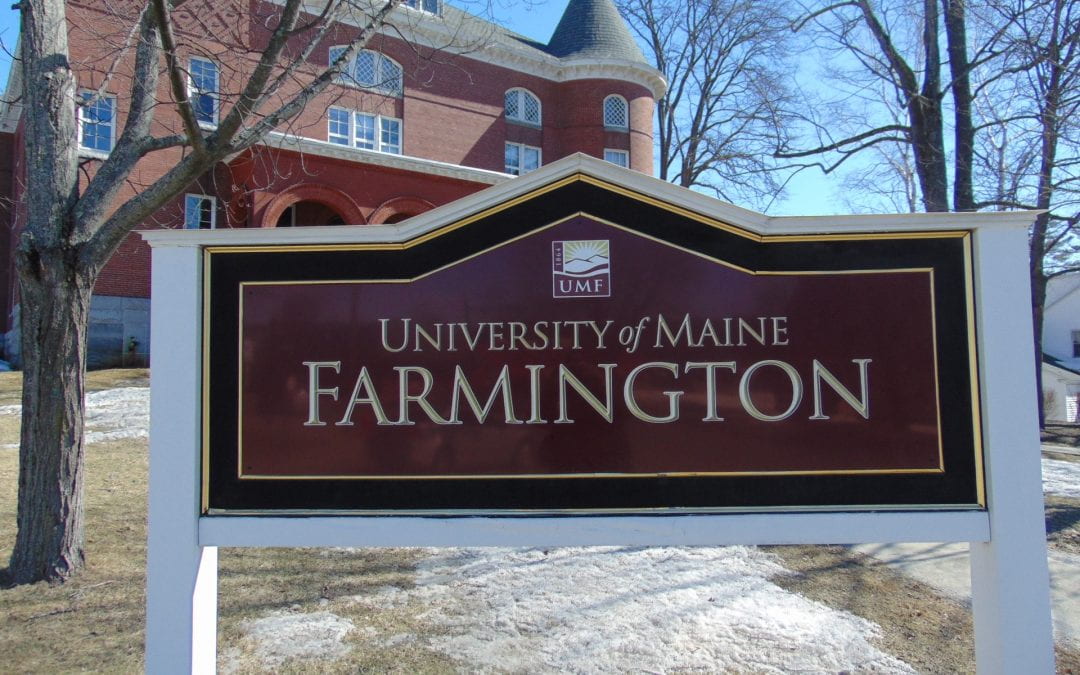
Apr 7, 2021 | Archives, News |
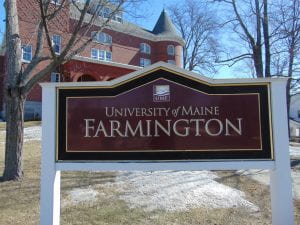
University of Maine Farmington by Sam Shirley.
By Daniela Lilly Rodiles, Staff Writer
Chancellor Malloy announced to faculty, staff, and students of the University of Maine System (UMS) the return to normalcy through traditional and in-person college experience in the coming fall 2021 semester.
The prioritization and continuation of COVID-19 asymptomatic testing together with mask wearing and physical distancing will continue to be in place as a way to assure student and faculty safety for the ongoing spring semester and commencement plans.
“We’re kicking our planning into high gear to provide the most traditional, on-campus college experiences this fall that we can safely manage,” said Malloy. This return to normalcy is focused on resuming in-class instruction, campus activities for the community, and residence hall occupancy resembling pre-pandemic conditions on campus.
UMF students have regained a sense of hopefulness and confidence regarding the plans to return to the conventional college experience that most students knew before the start of the pandemic, and that we all continue to miss. “I feel relieved,” said Anika Slowing-Romero, a freshman majoring in Rehabilitation and Psychology. “This year has been extremely hard and not what I expected at all, college-wise. But I am very hopeful and excited for what’s to come in the next semester.”
Chancellor Malloy’s email became the topic of discussion and conversation between peers, lighting up the possibility of brighter days around the corner, whilst acknowledging the outstanding resilience and commitment that has led all of us to this great news. “Your health and safety, and the health and safety of our university communities, remains our top priority,” stated Malloy, as he confirmed the plans that rely on the pandemic-ending vaccines and health safety practices imposed by the UMS Scientific Advisory Board, as well as Maine’s public health authorities as the basis to keep the UMS community safe.
The plans for commencement at UMF continue to uphold a remote ceremony to celebrate the class of 2021 and their achievements. “We promise to create a wonderful, albeit virtual, celebration experience and program with distinct recognition and personal touches especially for you and your achievements,” stated President Edward Serna.
The University will continue asymptomatic strategies and monitoring for COVID-19 throughout the semester to assure the safety of all students and staff until the last week of the semester.
Apr 7, 2021 | Archives, News |
By Malcolm Langner, Assistant Editor
On Jan. 20, Joe Biden, in his first day in office, officially signed the documentation which allowed the United States to rejoin the Paris Agreement, a deal which was originally signed back in 2016 by nearly 200 countries. The United States had been one of the many countries to sign on with the deal, but decided to leave the agreement under the Trump Administration on Nov. 4, 2019.
Marcia Hartwell, a political science professor at UMF, believes that The Paris Agreement holds plenty of importance throughout the world, especially with the recent and ongoing concerns over global warming. “I believe it is important for the U.S. to align themselves with the global issues, as no country is unaffected by climate change and related government issues.” said Hartwell. “Rejoining the Paris Agreement sends a signal that the U.S. acknowledges its national and global importance.”
Global warming has provoked extreme weather across the globe, and such weather is appearing to become more and more common. The U.S. is one of the greatest contributors to the effects of global warming. When the U.S. left the agreement, many feared industrial regulations would be limited and these worldwide concerns would only grow larger. “The 2019 UN Office for Disaster Risk Reduction documented in their 2019 report ‘Human Cost of Disasters 2000-2019’, that the extreme weather events experienced by the U.S. such as hurricanes, excessive rain and violent storms, extreme heat and cold, have accelerated worldwide in the past twenty years,” Hartwell said. “These events cross international borders and no country has escaped the human, social, and economic costs to its infrastructure.”
The ramifications for a widespread, unified coalition benefit the majority of parties across the world. Hartwell believes that maintaining close relationships globally will help combat cross-border environmental disasters. “Building international coalitions to assist with cross border emergency responses and collaboratively plan prevention strategies will help all countries manage and reduce current and future impacts and risks,” said Hartwell. Hartwell also notes that emergency response units like firefighters, paramedics, and the Red Cross will have greater capabilities in assisting those in need.
The Paris Agreement also creates a widespread sense of community. It helps send out a message of willingness to tackle one of this generation’s greatest obstacles. “The U.S. can also intensify efforts to increase climate change education, training, public awareness, participation, and access to information by utilizing transparent and relevant communication strategies on the local, regional, national, and international levels,” Hartwell said. “These are the first steps in the many needed to maintain and create a better global environment.”
The news comes during the transition of the end of Donald Trump’s presidency to the start of Joe Biden’s. Trump had little environmental plans and put greater emphasis on fewer restrictions, favoring the economy over the environment. Biden has already displayed vastly different ideals, putting the environment and the well-being of the planet ahead of economic value. Despite this, the Biden administration is seeking out environmental changes which can also help boost the economy.
Mar 6, 2021 | Archives, News |
by Maxen Ryder, Distribution Manager
UMF is welcoming Cortney Benjamin as a new Spanish professor this year. With Benjamin’s experiences visiting Buenos Aires and passion for the Spanish language, she has been labeled as a great addition to the UMF language faculty.
Benjamin has been learning Spanish most of her life. However, she was originally intent on learning French. “I was in middle school and I really wanted to take French, but my mom told me I had to take Spanish since there were more Spanish speaking communities near me when I was growing up. She thought it would be more useful, so I took both,” said Benjamin.
When planning out her young adult life, Benjamin was advised to stick to one language and dive into one culture. “I planned on taking both [Spanish and French] all through college and when it came time to study abroad I was gonna do one semester in Buenos Aires and one semester in Paris, but the study abroad advisor told me it would be a better idea to just pick one place and stick with it the whole year,” said Benjamin.
Originally from North Dakota, Benjamin felt a culture shock while experiencing Buenos Aires. “It was a very big change for me,” said Benjamin. “You know, I’m from Fargo, which is the biggest city in North Dakota, but it’s still not that big. And it’s not a place that people move to from other places. You are either born in North Dakota, or you’ve moved away from North Dakota…But Buenos Aires was huge, and I remember feeling like I had so much freedom.”
However, Buenos Aires was a great influential experience for her. “It’s such a wonderful place,” said Benjamin. “The architecture is so beautiful. It’s a very international city because of the different waves of immigration that came to Buenos Aires. Yeah, it really opened my eyes to living somewhere besides North Dakota.”
These experiences clearly instilled a passion for the language in Benjamin, as noticed by student Rachel Beechin. “I thought she had a real passion for the subject and was always eager to answer questions,” Beechin said.
When first arriving at UMF, Benjamin liked the small, tight-knit liberal arts community. “I think the liberal arts are so important. It’s so important to learn to think creatively and think critically, it’s important to learn how to write well,” said Benjamin. “It seemed like the students really had a voice on campus…and I really like the close relationship between faculty and students on campus.”
Benjamin’s background and values have increased her strengths as a Spanish professor. Alba Fernández, a Spanish teaching assistant, admires Benjamin’s passion for going above and beyond in teaching Spanish.”She teaches from a cultural perspective. She cares a lot about each student. If you have a particular situation and you need help, if you need to Zoom from home, or if you need extra help, she is willing to help,” said Fernández. “Learning a language involves your previous knowledge and your skills depend a lot on your work, but also who’s there on the other side helping you.”
To Fernández, having that personalized attention from the professor can make a difference when learning a new language. “Cortney [Benjamin] really cares about your particular case, not only with your schedule or personal issues and stuff, but she [also] cares about your individual learning process,” said Fernández.
Benjamin has found that the most meaningful benefit for her through teaching is the impact she has on her students. “I think it’s just helping students find their place as a global citizen, to think about themselves as citizens of the world,” said Benjamin.
Benjamin finds herself in a lot of students that haven’t explored the world outside of New England, as she had once been a young person who had never left her home state of North Dakota. “I think language classes are a way to explore the rest of the world in a fun way that may lead to future career opportunities and future travel once the pandemic is over, hopefully,” said Benjamin. “So I think what’s important to me is helping students develop some cultural humility and realize how hard it is to learn another language.”
Because of her experiences studying abroad, she always encourages students to take the opportunity to explore the world while attending UMF during safer circumstances through the international study abroad programs. “Study abroad is so important and it’s so important to what I do,” said Benjamin. “Hopefully, once the pandemic is over, there will be a lot of opportunities for UMF students to study abroad.”
If students are interested in studying abroad, she welcomes students to come to her with any questions they may have. “I’m always available to talk to students about my study abroad experience in Buenos Aires because it was such a life-changing experience for me,” said Benjamin. “It really opened my eyes coming from a more rural area of the United States. I hope that UMF students are able to take part in that sooner rather than later.”
If students are interested in studying abroad, email Lynne Eustis, Assistant Director of Global Education, at leustis@maine.edu to schedule an advising session or visit the Office for Global Education in room 106 in the Fusion Center.
Mar 6, 2021 | Archives, Feature, News |
By Paige Lilly, Contributing Writer
Before the pandemic, tutoring was one of the most readily available services for students at UMF. At almost any time, students could walk into the Mantor Library and there would be a tutor waiting to help them with their needs. Additionally, students could set up times to meet with tutors in specific subjects.
However, COVID-19 has made these services more difficult to access. Without searching, it would be easy for students to assume that tutoring services are currently available. However, tutoring is still a service that can be used by students if they need it. Cassidy O’Donnell, a sophomore actuarial science major who has been working as a tutor for the computer science department and the learning commons since the beginning of the academic year, has been a tutor since the beginning of this year. Therefore, pandemic-style tutoring through Zoom is all she has ever known.
The style of tutoring is different for each job. “The computer science department creates a flyer of all of their tutor’s zoom meetings and the times. Then the department emails it out to their students,” said O’Donnell. “Students are free to come to the sessions whenever they need help.”
There are multiple tutors for the department, most of which do not overlap with each other. O’Donnell says that this is convenient because students can check the list and find a time with a tutor that works for them.
With the Learning Commons, students control the schedule instead. “Students can schedule appointments using the Navigate app or online through Navigate, which is accessible through MyCampus,” O’Donnell said. In the Navigate app, students are able to select their tutor, the time for the session, what subjects they need help with, and any additional information they would like to provide to their tutor. This allows students and tutors to find times that work with their busy schedules.
Mullein Francis, a sophomore biology major and tutor, is also employed through The Learning Commons tutoring program. She highlighted a few challenges that tutoring on Zoom has presented. “It can be hard when tutoring subjects like math, when you really just want to point to something on the paper to show them,” said Francis. “When you’re on Zoom, you have to work with the camera, switching between writing things on your paper and holding it up to show the person you’re tutoring.” Although this is a struggle, Francis said that tutoring over Zoom has generally been a positive experience.
One thing that Francis likes about tutoring over Zoom is the flexibility that it offers for both the tutor and the student. “It’s nice because Zoom meetings can be a lot easier to fit into my schedule,” Francis said. “When you’re in person, it can be harder to find a time that works, because you have to factor in the time to physically get to the meeting, which can make it tricky.”
O’Donnell enjoys the positive impact that tutoring has on students. “The tutoring program is confidential so students don’t have to worry about tutors talking to each other or other students about them,” O’Donnell said.
Francis also encourages students who need some extra help to sign up for a virtual tutoring session. “School can be so stressful,” she said. “It’s rewarding to be able to help people get rid of some of that stress.”
To schedule a tutoring session with the Learning Commons, download the Navigate app on your smartphone’s app store.
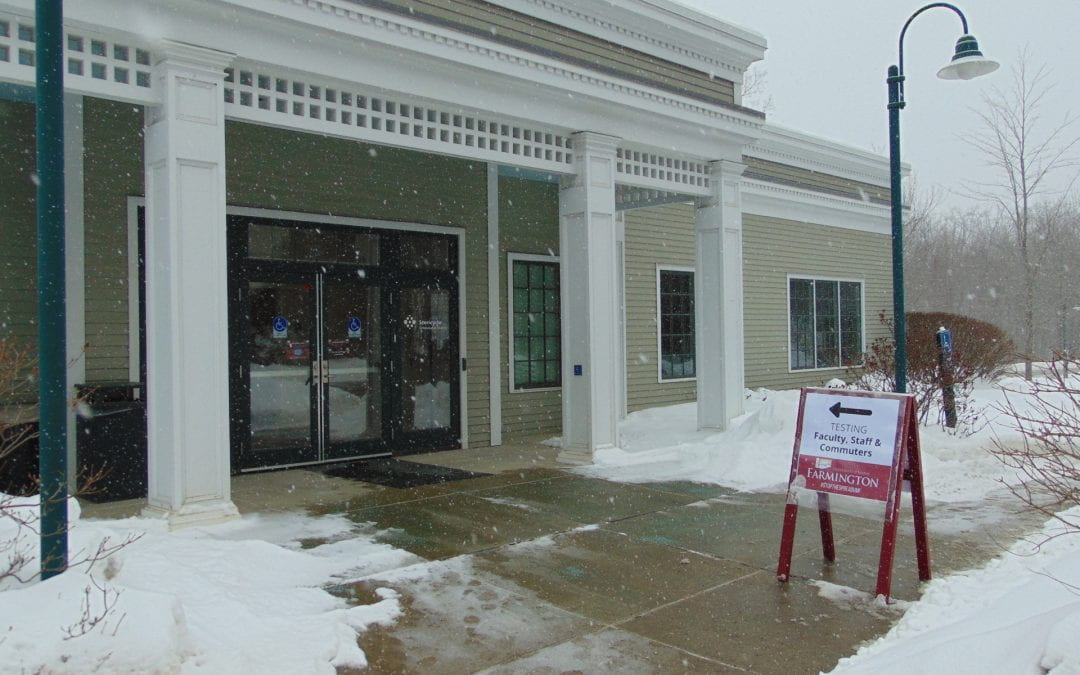
Feb 18, 2021 | Archives, News |
By Paige Lilly, Contributing Writer
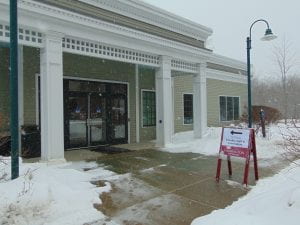
274 Front St. by Sam Shirley
As the new semester begins, UMF has opened the doors of a new COVID-19 testing center intended for the testing of commuter students, faculty, and staff.
Residential students will continue to be tested in Dearborn Gymnasium, while others will be tested at the new center located at 274 Front St. The new testing center will continue to help with social distancing while testing, along with minimizing interactions between residential and commuter students. “You can only do so much [to minimize student interactions] in terms of classes, but I definitely think it’s going to make a huge difference in terms of people’s safety,” said Jessica Howe, the COVID-19 Testing Coordinator.
Howe believes that with the large volume of students being tested this semester, the new testing center will keep crowds down and allow for better social distancing than Dearborn Gymnasium would alone. “With too many people, you can’t social distance or make a proper line in [Dearborn Lobby],” Howe said.
During the fall semester, students, faculty, and staff were randomly selected to get tested in each phase of testing. However, according to an email sent out by Christine Wilson on behalf of the Asymptomatic Testing Team, all students, faculty, and staff who “live on campus, take or teach classes on campus, work on campus, or participate in student athletics” are required to be tested every week this semester in Phase 6 of UMF’s asymptomatic COVID-19 testing.
Getting the word out about that has been another challenge Howe and her team have been facing, but signage and frequent emails have been a factor in overcoming this challenge. “We’re encouraging people to set a time to be their designated testing time every week,” Howe said. “We want people to put it on their calendars and then go through and sign up with us.” This is not required, but Howe believes that it is a great way for people to remember to get tested every week.
Elena Guarino, a sophomore, is one of the students who has tested at the new testing center. “It was interesting because I had never been to that site on campus before so it was a little tricky trying to figure out where to go,” said Guarino. “There is only one entrance [into the parking lot of the building], which I didn’t realize, so I ended up missing it the first time I drove by.”
Troy Johnson, a junior, said he appreciated being able to see the same style of posters that would usually hang on the student center walls in the testing center. “I lived on campus for two years, so being in the student center was a daily occurrence for me,” Johnson said. “Now, I live off campus and because of [COVID-19], I don’t really go [to the student center] much.”
Howe is also excited about the potential that the testing center has for communication with commuter students. “I’ve been trying to hang posters up similar to what would be seen in the student center in order to connect with students in that way.” Her main goal is to keep students, faculty, and staff both safe and engaged in their testing experiences.






